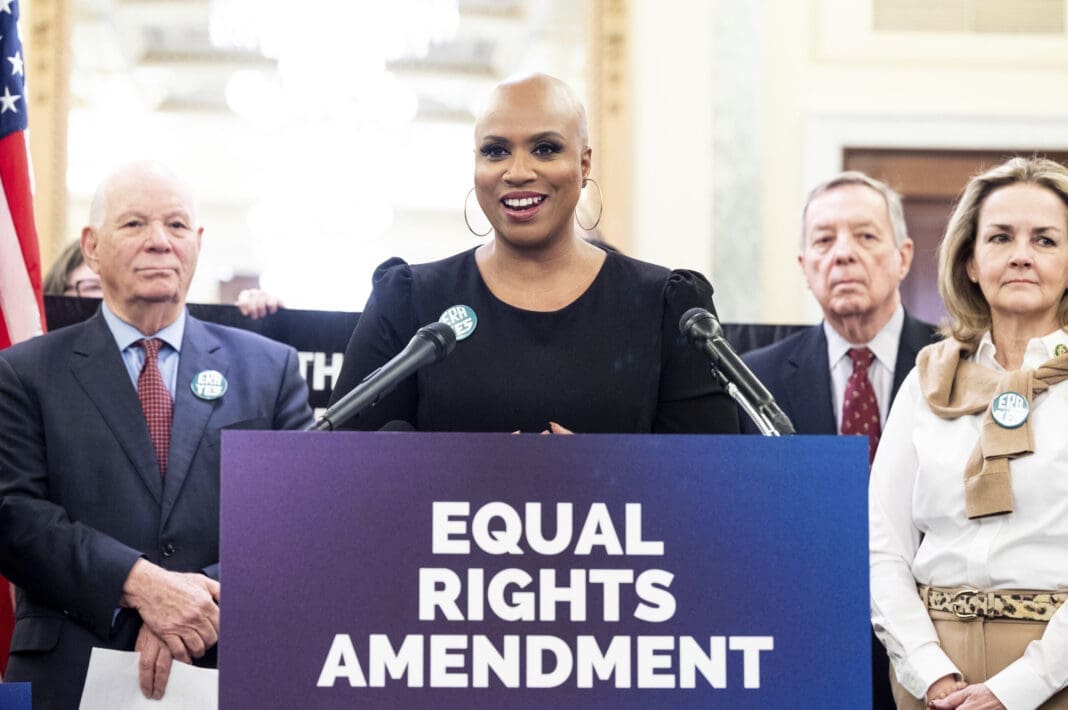Why the Equal Rights Amendment is still a work in progress 100 years later
The Equal Rights Amendment has met the requirements to be added to the Constitution, yet it remains unadopted.

Originally published by The 19th
By Errin Haines, Editor-at-large. Subscribe to our weekly newsletter.
Most Americans think equal rights regardless of sex are already part of the U.S. Constitution. But 100 years later, the effort to codify gender equality as an amendment continues.
While the Equal Rights Amendment has made it through all the necessary steps, it didn’t hit the deadline set by Congress to become the 28th Amendment. Now supporters are trying to use the centennial of its introduction to build momentum for its passage. They say the ERA now feels more urgent than ever, as women and LGBTQ+ Americans face continued discrimination and a renewed effort to roll back their rights.
“The activists did their job, the states have done their job,” said Democratic Rep. Ayanna Pressley of Massachusetts, who introduced a resolution in January that would clear the way for the ERA’s ratification. “Now Congress has to do our job.”
The struggle for freedom and equality in America has always been one over the expansion or limiting of rights, of ideas about who is able to fully participate in our democracy and society. And it has been waged by every generation of Americans, of all races, ages and genders. While support and opposition generally break down along partisan lines, currently with Democrats for and Republicans against, it’s not always a neat divide.
The ERA states: “Equality of rights under the law shall not be denied or abridged by the United States or by any state on account of sex.” While at its introduction it was understood to be about expanding rights for women, proponents now say the ERA’s guarantees would also protect LGBTQ+ Americans. The bill was introduced in every session of Congress from 1923 until 1972, when it gained a groundswell of support amid the Women’s Liberation Movement. It came close to ratification in 1973 after 35 of the 38 required states voted in support of the measure.
In 1978, Congress extended the ratification deadline to June 30, 1982. But when no additional states ratified the ERA before the deadline, the measure stalled.
In recent years, there has been a push to resurrect the amendment, and the final three states voted to support it, but the 1982 deadline still stands as an obstacle in Congress. The resolution faces long odds in the GOP-controlled House.
The ERA was originally part of the suffragist movement, first written and presented by Alice Paul and Crystal Eastman, both White women, at the 75th anniversary of the Seneca Falls Convention. The women had just fought and won the generations-long battle for the 19th Amendment, guaranteeing voting rights for some women. (The omission of women of color when the 19th Amendment became law in 1920 is noted in our newsroom’s logo with an asterisk.)
In the decades since, the ERA has been championed by a diverse coalition of women and other people from marginalized communities who stand to benefit from its protections. It also continues to face opposition, including among conservatives who say the ERA is no longer necessary and argue proponents are using the amendment as a means to federally legalize abortion.
Today, the ERA Coalition, started in 2014 as the leading advocacy group for the legislation, says the organization has nearly 300 partners representing 80,000 people in support of passing the amendment. When I asked about its prospects now, ERA Coalition President Zakiya Thomas said: “We’ve never been closer to having the ERA added to our Constitution, but there continues to be a fight.”
“We’re trying to change our approach in some ways, especially focusing on the inclusivity part of it,” Thomas told me. “We understand that sex equality is crucial to us having a better society in this country. This is a movement of all movements.”
Pressley agreed, adding that the record number of Black women in Congress in particular presents an ideal moment to pass the ERA.
“Black women have always been on the front lines of doing the work of liberation for everyone else, even when we’ve been left behind,” Pressley said. “The fact that today, this is now a multiracial, intergenerational fight being initiated by women of color, I think, is notable.”
Last month, the Senate Judiciary Committee held its first hearing on the ERA in 40 years.
Committee Chairman Dick Durbin, who got his start in politics more than a half century ago as a young lawyer and state Senate staffer in Illinois working to help pass the ERA there, told his colleagues, “There is no time limit on equality.”
“It’s time to get the job done. In fact, it’s long overdue,” Durbin said.
Republican Sen. Cindy Hyde-Smith, the first woman from Mississippi in the upper chamber, testified during the hearing that the ERA is an “unconstitutional and deeply misguided effort” that “would harm the very woman it intends to protect.” Hyde-Smith countered that women’s rights have advanced in the last century, and that other laws have been put in place to ensure women’s equality in America.
Support for the amendment doesn’t always break down along party lines, though. Republican Sen. Lisa Murkowski of Alaska has been a vocal supporter, introducing a resolution to recognize that three-quarters of the states have ratified it.
“We know that things have improved over the years, but we still have a long ways to go when it comes to achieving equality for women, and I think we need the Equal Rights Amendment to get there,” Murkowski said at the Senate Judiciary hearing.
President Joe Biden last year put out a statement affirming his strong support for the ERA. But just this week, as part of The 19th’s observance of International Women’s Day, I interviewed the U.S. ambassador to the United Nations, Linda Thomas-Greenfield, whose role includes a focus on gender equality for women and girls around the globe. When I asked her whether she thinks the ERA is still necessary, Thomas-Greenfield lamented that the bill fell short in her youth, but said, “we found another way around that” when women demanded their rights in American society.
“I think we have seen many of the provisions of the Equal Rights Amendment have been implemented,” Thomas-Greenfield said. “Implementation, of course, requires commitment. So what we have to do is make sure that policies that are put in place are implemented. I don’t know the answer to the question of whether we actually need an Equal Rights Amendment. What we need are equal rights.”
In 2023, a record number of women are serving in Congress, as governors and as state lawmakers. But Democratic policy priorities that experts argue would help protect women in the workforce, from caregiving to the child tax credit and raising the minimum wage, remain stalled. The Supreme Court’s Dobbs v. Jackson Women’s Health Organization decision in June ended federal protections for abortion, and the months that followed have been legally chaotic, with real-time consequences for millions of people.
Despite women’s increased representation, we are governing and living in a climate where many women are less free, less safe and less equal. Given the combination of greater visibility and an erosion of rights, what are the opportunities for and challenges to progress now?
Supporters say the answer to both questions could be found in the Equal Rights Amendment, which would protect rights regardless of election outcomes. Biden and Vice President Kamala Harris pledged that equity would be at the core of their administration, but the issue may not necessarily be a priority for their successors. Adding gender equity to the Constitution would make it harder for courts to challenge the rights of women and LGBTQ+ people.
Like the fights over voting rights, equal pay, housing or education, the framing around addressing discrimination often devolves into a debate over winners and losers, rather than a vision of a more inclusive society. Thomas said part of her role is to help people understand that the ERA is for everyone.
“There’s this sixth sense we have in this country that if someone is getting something, that means something is being taken away from someone else,” Thomas said. “This is about the broader promise of equality in our country.”
Recommended

Alaska House committee advances, expands proposal to bar trans girls from girls sports
Amended bill would add elementary, middle school and collegiate sports to limits in place for high school
By Claire Stremple, Alaska Beacon - April 16, 2024
Bills targeting trans people are on the rise nationwide and in Alaska — most focus on children
House committee advances legislation that would restrict the rights of Alaska trans kids
By Claire Stremple, Alaska Beacon - April 01, 2024
Anti-abortion, anti-LGBTQ resolutions to be voted on at state Republican convention
A resolution to be considered by North Dakota Republican Party delegates at their upcoming convention would define life as beginning at fertilization and call for criminal penalties for “anyone who kills a pre-born human being.”
By Michael Achterling, North Dakota Monitor - March 26, 2024










































































